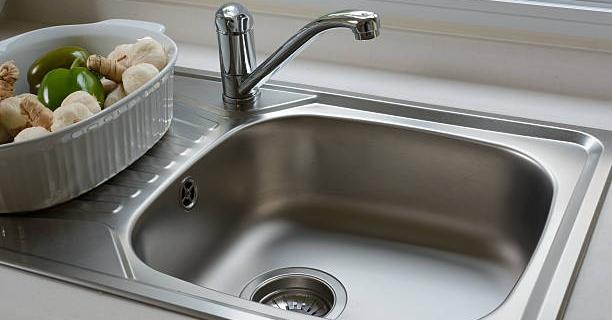Garbage disposal units are kitchen machines that shred and dispose of organic food waste. They are also known as garbage disposals or food waste disposers. These electrically powered devices are commonly installed beneath kitchen sinks and are linked to the plumbing system. These machines are an easy and environmentally friendly way to manage food scraps, lowering the quantity of organic waste that ends up in landfills.
Garbage disposal machines, frequently lauded as modern marvels of kitchen technology, have become standard in houses worldwide. These electrically powered devices, which are put beneath kitchen sinks, are designed to shred food waste into tiny bits that can pass through plumbing. While waste disposition devices have many advantages, they also have certain disadvantages. Let us look at the benefits and drawbacks of trash removal systems, as well as the advancements that have molded their history over time.
Pros of Garbage Disposal Units
- Convenience and Efficiency – One of the primary benefits of a garbage disposal system is its convenience. They eliminate the need to collect food scraps in a separate bin, reducing the hassle of managing kitchen waste. Users can simply wash food remnants down the sink, making clean-up after meals quick and efficient.
- Environmental Benefits – These machines contribute to reducing landfill waste. By grinding food waste into small particles, they can be processed at wastewater treatment plants, where biodegradable waste is converted into renewable energy or fertilizer. This environmentally friendly approach helps in reducing the overall carbon footprint.
- Improved Kitchen Hygiene – Households notice reduced odors and a lower risk of attracting pests such as mice and insects when there are fewer food scraps in the trash bin. Garbage disposer units contribute to a cleaner and more sanitary kitchen environment.
- Water Conservation – Modern garbage disposals are designed to use water efficiently, and many models are equipped with sensors to regulate water usage. This ensures that water is not wasted during the disposition process, aligning with the principles of eco-friendly living.
- Time and Money Saving – By reducing the frequency of trash disposal, homeowners save time and money on trash bags and waste collection services. Additionally, the reduced need for plumbing repairs due to food clogs can save on maintenance costs in the long run.
- Versatility – Garbage disposals can handle a wide range of food waste, including fruit and vegetable peels, coffee grounds, small bones, and non-greasy leftovers. This versatility allows users to dispose of a variety of food scraps easily.
Cons of Garbage Disposal Units
- Initial Cost and Installation – This requires a significant initial investment, including the cost of the unit itself and professional installation charges. While they can save money in the long term, the upfront expense might deter some homeowners.
- Environmental Impact – While this reduces landfill waste, it also contributes to higher nutrient levels in wastewater, which can affect aquatic habitats if not managed appropriately. To reduce the environmental impact, efforts are being made to improve wastewater treatment systems.
- Limited Capacity – Trash disposals have limited capacity and may struggle with large quantities of food waste at once. Users need to feed waste gradually to avoid clogs or overloading the system, which can be inconvenient during large family gatherings or events.
- Maintenance and Repairs – Garbage disposition units require regular maintenance to prevent odors and clogs. Additionally, they can break down due to wear and tear or misuse, leading to costly repairs. Proper usage and maintenance are essential to prolong the unit’s lifespan.
- Not Suitable for All Foods – Trash disposals cannot handle some materials such as grease, oils, fibrous foods (such as celery), huge bones, and hard objects. Attempting to dispose of these objects may cause harm to the disposition device or clogs in the plumbing.
Innovations in Garbage Disposal Units
Over the years, garbage disposal units have undergone significant innovations to enhance their efficiency, sustainability, and user experience:
- Quiet Operation – Earlier models of popular units were notoriously noisy. Modern units feature advanced soundproofing technologies, making them much quieter during operation. This innovation improves user comfort and minimizes disturbances in the kitchen.
- Energy Efficiency – Newer models are designed with energy-efficient motors that consume less electricity while maintaining high performance. These energy-saving features align with the growing emphasis on sustainability and reducing household energy consumption.
- Smart Technology – Smart technology, such as sensors and communication possibilities, is now available in garbage disposals. These sensors can recognize the type and quantity of waste, allowing them to optimize water usage and grinding power accordingly. Smart connectivity lets customers remotely monitor the unit and get maintenance notifications, assuring peak performance.
- Enhanced Grinding Capabilities – Advanced grinding technologies in modern units can handle a broader range of food waste, including tougher items like chicken bones and fruit pits. This enhanced grinding capability reduces the risk of clogs and provides users with greater flexibility in disposal.
- Septic System Compatibility – For properties with septic systems, specialized waste disposals are available. These units include bio-charge enzyme treatments that efficiently break down food waste, boosting natural decomposition within septic systems and decreasing tank strain.
- Easier Installation – Manufacturers have introduced models with simplified installation processes, making it easier for homeowners to set up the units. Clear instructions and user-friendly designs have streamlined the installation experience.
Garbage disposal has gone a long way since its introduction, providing households with a handy and environmentally responsible option to manage food waste. While they have limitations, continual advancements are addressing these difficulties, making waste removal more effective, user-friendly, and environmentally sustainable. Future iterations of garbage disposal units are anticipated to improve their performance as technology progresses, making them an even more appealing option for homeowners looking for effective waste management solutions.
The future of garbage disposal units is expected to be influenced by technological advancements, environmental concerns, and customer desire for more efficient, sustainable, and convenient waste management solutions. As customers become more conscious of environmental impact and sustainability, advancements in garbage disposition technology will play a vital role in influencing the future of kitchen waste management.






